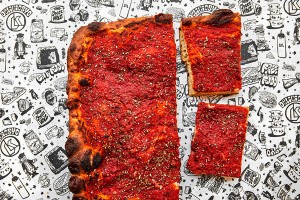The Star System is Stupid and Broken
At the conclusion of last week’s 3-star Stargazy review, a reader asked a very difficult question:
So what about this doesn’t say four stars? The fact that it’s stuff-yourself delicious, worth going out of your way for, has value or that each of your experiences has been a win? Sounds like a straight flush to me. A rarity for Philadelphia, or anywhere for that matter.
Sincerely,
A Confused Glutton
And it’s true. I loved Stargazy. I’ve been dreaming about the banofee tart (pictured above) and the sausage rolls for a week. So why doesn’t a place like this deserve four stars?
The answer is simple. Stars (or bells or thumbs or forks or any other kind of rating system) are stupid, subjective short-hand added almost entirely as a tl;dr for people too lazy to read actual words. I’ve known a lot of critics in the nearly 15 years that I’ve been reviewing restaurants and not one of them ever had a defense for them more nuanced than “we use them because we use them.”
Which, in part, is why I’m still using stars. I hate stars. I’d never used them before taking over the critic’s gig here a few weeks back, but Philly mag has been using stars to rank restaurants for a very long time. Readers are accustomed to seeing stars. Restaurateurs and chefs are accustomed to seeing stars. Four-star reviews and one-star reviews cause a buzz in the wider world (even if they’re so rare that I can count TreyPopp‘s complete history of one- and four-star reviews on a single hand) and, arguably, a star system does make for a simple, Yelp-esque filtering mechanic by which someone unfamiliar with nuance or subtlety might think he’s getting the best experience in Philly by only visiting restaurants with three stars or more.
So one answer to Glutton’s question? Sure, give Stargazy four stars. Give it nine stars for that matter. Because you, wise commenter, read the actual words in the review and decided that you liked the sound of Stargazy. It sounded awesome, right? Sausage rolls and pasties, melty toffee, parsley liquor and steamy, warm pies on a cold afternoon? To your mind, this sounded like the best possible kind of restaurant and, thus, deserved the highest number of stars available.
But that’s never really been the way stars work. Because, traditionally, stars were a way to compare apples to apples and oranges to oranges, there was always an unnatural sort of limit imposed. A small restaurant without a bar or wine program, with just a couple wood tables and an exposed kitchen, no servers, and a highly focused menu (like Stargazy) was just never going to rank alongside the best restaurants in the city no matter how good the food was. Giving four stars to, say, Volver (the sole four-star review Trey gave while we worked together) and then giving four stars to Stargazy (a restaurant just about as unlike Volver as any restaurant could be) does no service to readers who are looking at things based solely on stars.
This is a problem with stars, not the readers, you understand? The star system’s usefulness is internally limited. Which is just a fancy way of saying that stars are essentially useless to people who actually care deeply about getting a great meal.
So… Knowing all this (and having spent more than a decade being pissed off about the star system in both general and specific ways), I made a change when I took over as restaurant critic. Yes, we would still use stars (because we’ve always used stars), but I would use them differently than they’d been used in the past.
Where previously stars equaled quality of experience (1 star was pretty shitty overall, regardless of setting, 4 stars was more or less flawless, and absolutely meant a sit-down-y, fancy-pants dining room with great wine and perfect service, et cetera, with 2 and 3 star reviews covering everything in between), our new system is based on something more like geography.
Or maybe not geography. Maybe area of effect. Staring with the 3-star review of Bud & Marilyn’s from a few weeks back, the new star system breaks down like this:
0 Stars–Sucks. Just stay away and don’t waste your time or money.
1 Star–Come if you have no other options.
2 Stars–Come if you’re in the neighborhood.
3 Stars–Come from anywhere in the region.
4 Stars–Come from anywhere in the country.
This system speaks to something inherent in the diner’s psyche, I think–the notion that neighborhood restaurants are awesome and form the backbone of Philadelphia’s dining scene, but that this city also has many places good enough to draw customers from all over the city, and a few that should be on the radar of dedicated gastronauts in New York.
Bud & Marilyn’s scored 3 stars. It’s a great room with a great bar and no matter where you are in or around Philly, you should make plans to come here for fried cheese curds, fried chicken and meatloaf. Whetstone Tavern’s review came the following week, and there, Jeremy Nolen is very deliberately cooking for his neighbors–doing solid Pennsylvania-inflected American cuisine in a nice space with a good bar for snacks and drinks. If you’re close, you should totally stop by for dinner and a couple gin and tonics at the bar, but if you’re not, you’ll probably find similar places wherever you are. Southgate? Same deal. It got two stars because if you’re in the area, you should absolutely get here for snacks and drinks, a couple plates of Korean fried chicken wings, and one of the best Tuesday burgers around.
And Stargazy? Man… It’s so good that, yes, even though it’s small and cramped and booze-less and essentially a take-out joint, you should come here from wherever you are. You should make plans. Pick a date. Go out of your way to drop by because, first, the food is just that good and, second, there’s not much else in the city that compares.
Why didn’t it get four stars? Because Stargazy is great, but no matter how much I loved it, I know it’s not worth driving in from Manhattan just for a sausage roll and a pastie. I’m obsessive, but not delusional.
This is the system we’re going to be using going forward. It’s not perfect, but I believe it’s a definite improvement over the former. And if nothing else, I hope this (very long and overly detailed) explanation answers Glutton’s question.
Tl;dr? Stars are stupid, but we’re working on it.
All Recent Restaurant Reviews [f8b8z]

